必修五 1.4《Unit 1 Great Scientist》
- 格式:ppt
- 大小:422.50 KB
- 文档页数:22

人教版英语必修五 Unit 1 Great scientists重难点【重点】(1)了解著名医生John Snow、钱学森、哥白尼等科学家以及他们的作为和故事。
(2)学习表示意愿、希望和建议的句型。
(3)学习过去分词作定语和表语的结构。
(4)学习写好“persuasive writing”,以训练学生的逻辑思维及写作能力.一、重点单词1、characteristic n. 特征,特性2、expose vt. 暴露,揭发,曝光(摄影)3、defeat vt. & n. 击败;战胜;4、cure vt. & n. 治愈,治疗法5、blame vt. 责备,归咎6、backward adj. & adv. 向后7、conclude vt. & vi. 结束,总结二、重要词组句型1、in addition 此外2、apart from除……以外(except for);除……外,还有(besides)3、be strict with sb. 对某人严格4、lead to 导致,通向(to 为介词)5、link…to… 将……和……连接起来6、keep sb /sth +doing /done /adj. 让某人或事物做……三、课文长句难句1、In addition, he found two other deaths in another part of London that were linked to the Broad Street outbreak.2、To prevent this from happening again, John Snow suggested that the source of all water supplies be examined and new methods of dealing with polluted water be found. 2四、语法知识——过去分词的用法【词汇积累】1. put forward 提出2. draw a conclusion 得出结论3. be/get under control 在……控制下be/get out of control 失去控制,不能操纵4. be absorbed in 专心5. be to blame 应该受责备(用主动形式表示被动)blame sb. for sth. 因某事责备某人6. in addition 也,另外,此外7. link...to... 将…和…连接或联系起来8. die of 因…而死亡(内因)die from 因…而死亡(外因)9. lead to 导致,通向10. make sense 有意义,说得通11. apart from 除…之外,此外12. contribute to 为…作贡献或捐款,导致,有助于13. be enthusiastic about 对…热情14. be curious about 对…好奇15. cure sb. of illness 治好某人…病16. point of view 态度,观点,看法17.(be)strict with sb. 对某人要求严格【重点单词用法精解】1. characteristic n. 特征,特性The chief characteristic of human being is that they can think. 人类主要的特征是他们会思考。
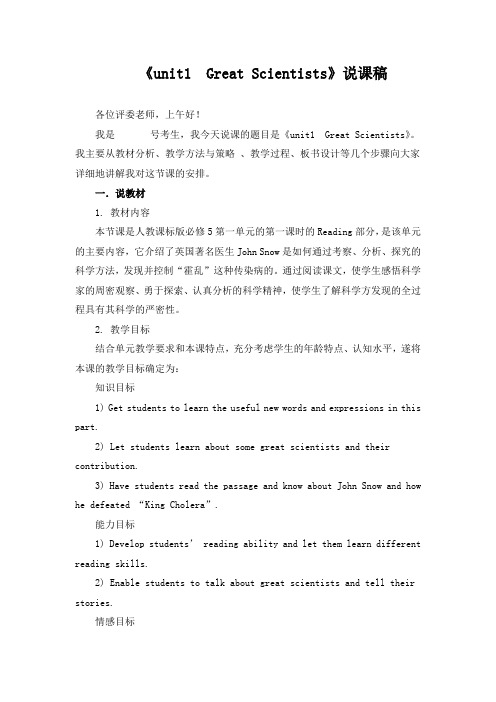
《unit1 Great Scientists》说课稿各位评委老师,上午好!我是号考生,我今天说课的题目是《unit1 Great Scientists》。
我主要从教材分析、教学方法与策略、教学过程、板书设计等几个步骤向大家详细地讲解我对这节课的安排。
一.说教材1. 教材内容本节课是人教课标版必修5第一单元的第一课时的Reading部分,是该单元的主要内容,它介绍了英国著名医生John Snow是如何通过考察、分析、探究的科学方法,发现并控制“霍乱”这种传染病的。
通过阅读课文,使学生感悟科学家的周密观察、勇于探索、认真分析的科学精神,使学生了解科学方发现的全过程具有其科学的严密性。
2. 教学目标结合单元教学要求和本课特点,充分考虑学生的年龄特点、认知水平,遂将本课的教学目标确定为:知识目标1) Get students to learn the useful new words and expressions in this part.2) Let students learn about some great scientists and their contribution.3) Have students read the passage and know about John Snow and how he defeated “King Cholera”.能力目标1) Develop students’ reading ability and let them learn different reading skills.2) Enable students to talk about great scientists and tell their stories.情感目标1) Let students learn from great scientists, stimulate their love and respect for them and develop their moral qualities.2) Develop student’s sense of cooperative learning.3. 教学重点因为本组教材的重点了解项目是“John Snow 破解King Cholera难题”,所以确定本课的教学重点是:1) Let students learn about some great scientists and their contributions.2) Get students to read the passage and know about John Snow and how he defeated “ King Cholera”.3) Have students learn different reading skills.4.教学难点考虑到学生拓展阅读能力,语言输出能力等方面还需进一步努力,所以将本课的教学难点确定为:1) Develop students’ reading ability.2) Enable students to talk about great scientists and tell their stories.3) Let students learn how to organize scientific research.二.说教法和学法1. 教学方法引导学生独立思考,合作学习,进行师生、生生互动的“任务型”教学,设计了许多易于操作的任务型活动。

新人教版高中英语必修5《Unit 1 Great scientists》精品教案New Senior English For China Student’s Book 5(Reading Part)P2 Unit1(Period1Warming up and Reading)Step I Warming upDo you know these famous scientists?( Show the Ss some pictures of great scientists and have them say what achievements they have made.)Step II. Pre-reading1.Background introduction to John SnowJohn Snow (1813-1858) was born and worked as a doctor in Great Britain. He was originally an anesthetist(麻醉师).He was so famous that he became the doctor for Queen Victoria at the births of her many children.Four outbreaks of cholera in the 1830s and 1840s killed many people in England. In 1854, “the most terrible outbreak of cholera which ever occurred in the kingdom” began. It was so violent and s udden that 127people died in the first three days.What was the cause of this illness ? How did John Snow find it out? (Deductive thinking)Step III. New words studyShow the Ss a picture of “Water pump”, teach the new words pump& handle and have a brief introduction to it.(e.g. There were some water pumps in different districts in England in the 1850s.. People could use them to pump the water for daily life, but if someone removed the handle from the water pump, it could not be used.Step IV. ReadingFast—reading:Read the passage quickly and find the number below and the relevant happenings in theparagraph and findout what evidenceor approach is JohnSnow used in thestage of experiment,then fill in the chartbelow.Step V. Discussion1.What’s the significance of Snow’s famous cholera map ?2.If you were John Snow, how would you investigate the cholera?Step VI. SummaryStep VII. Homework assignment1.Finish Ex.1 on P42.2. Retell the story.3. Prepare for tomorrow’s dictation.P9 Unit2 The United Kingdom(Period 1 Warming up and Reading)Step 1 Warming up& lead-in1. Game playingT: Morning everybody! You see, nowadays, travelling abroad are becoming more and more popular. So if you have a chance to go aboard, which country do you want to go most? How much do you know about that country?T: Very good! Just now some of you shared your ideas, and now let’s play a short game: Guess which country it is! Altogether there are 8 groups, you are asked to choose one item and guess which country it isaccording to the related information offered to you.1. People----America2. Music----Argentina3. Video----Australia4. Food-----Italy5. Shooping----France6. Architecture-----China7. Poetry-----the UKStep2 Pre-Reading1. Brainstorming :T: Now you have a chance to go to the UK. , before you go there you’d better go to the library to search for some information about the country. What kind of information about it you want to find out?S: geography, literature, politics, sports, sightseeings,cultures, ethnic groups, famouscities, food, history, language, fashion, life styles …….T: How much do you know about these?Step 3 Reading1. Fast-reading.1)Task 1:Question: What kinds of information are mentioned in the text?(sports, geography, history, flag, London, The biggest country England, flag,invasions).2) Task 2:How many parts can this passage be divided into and what the main idea of each part is?.Part1(para1-4): How the UK came into beingPart2 (para5): England is divided into 3 zones.Part3 (para6): The reason why London became the cultural capital of England.2. Careful readingPart 11) T: Very good! So could you tell me how many countries the UK consists of and what they are?S: The UK consists of four countries, that is England, Wales, Scotland and Northern Ireland.2) T: Exactly! Then does these four countries united in one day?S: No.T: Then how can the UK come into being?S: First there was only England, then in the 13th century AD, Wales was linked to the England, and in 1603, the two were joined to Scotland to make the Great Britain come into being. Later, Northern Ireland was united to theGreat Britain to form the UK.T: Wonderful job! Actually the history can be shown in the national flag called the Union Jack.3) T: By the way, you see, the flag Union Jack only unites England, Scotland and Northern Ireland, with Wales left out. So do you know why?S: Becauseit is usually assumed to be part of England.T: Yes! And according to the passage, although the four countries belong to the UK, they are still quite different in some aspects, so in what ways are the four countries different?S: They are different in international relations. They have different educational and legal systems as well as football teams.Part 2T: Among the four countries, England is the largest, and for connivance it is divided into 3 zones. What are they?S: The South of England, the Midlands and the North.T: Good! And now could you tell me what the feature of each zone?Most population settled inThe South of England.Most of the large industrial cities are in the North and the Midlands.Many cities have famousfootball teams.Part 31) T: So we all know the UK has a long history and of course rich culture,and the cultural center is,obviously, the capital city London. So why can London become the cultural center ?S: Because there are a lot of historical treasure in London.T: Why there are so many historical treasure in London?S: London has been influencedby some invaders.2) T: Actually, in the England history, altogether there are four invasions, do you know what they are? S: The Romans; The Anglo-Saxons; the Vikings; the Normans.T: What did they left in England?S: the Romans left towns and roads, theAnglo-Saxons language and government, the Vikingsinfluence the vocabulary and place-names of the North and the Normans castles and words for food.Step 4. Post-Reading1. Task 1 Role-playTwo students act as tourist guides, and two students act as the tourists who want to go to the UK. Before they start, they ask the guides some background information of the UK.2. Task 2 Discussion of ideasThis is an opportunity to allow students to draw connections in the history and the geography of England. Ask students work in groups of 4, and every group choose 1 topic. At last the group leader should give a representation of their ideas.1) What similarity is there between the invasions of the Romans and the Normans?2) What similarity is there between the invasions of the Anglo-Saxons and the Vikings?3) Why does London only have evidence from three of the four invaders?4) What geographical factors make it difficult to invade England successfully?3. Task 3 DebateIn the history of the UK. , there are some important inventions. Those invaders ruled the country for sometime. They brought pains to the local people, but at the same time, they also brought something new to the country, which is important for the making up of its history.“Is the inventions good or bad to the country Britain?”Step5 Homework1. Read the text and try to find out some important or difficult words and expressions.2. Write a short summary of the passage.3. Preview “Learning about Language—Discovering useful words and expressions”.P17 Unit3 Life in the Future(Periods 1-2 Warming up and reading)Step 1 warming upTalk about how many changes there have been in the last one thousand years. And what changes we might expect to find in the next one thousand yearsStep 2: pre-reading1.Can you tell what problems people are facing today?2.what problems do you think people in the future will have overcome?Which ones will still be there or even worse in AD3005?(Key: 1The problem of population will be solved,have begun to Control the birth rate. //2The problems will be still there,and will even worse.// 3I don’t think so.Now scientists are trying their best to develop new resources that human beings can make use of ,such as solar energy.In my opinion……)Step 3:fast reading1. Read the text for the first time and tell what the text is about?It’s an e-mail written by a man Who has taken up a trip to the future.2. Look at the following sentence, there are in wrongorder, tell me the correct order for these sentenceA. We were transported into the future by acomfortable time capsule.B. I arrived a t Wang Ping’s home andeverything in his house made mesurprised.C.I won a travel to the year AD3005D. I have my first try to master a hoveringcarriage.Step 4 careful reading1.Answer the following questions:1.Why did I have the chance to travel to the year AD3005?2. What is a “ time lag”?3. How did I feel when I was in the capsule?4. Who guides my trip?5.Why did my guide give me some tables?6.Who transported us to the future?Key:1. I took up the prize I won the year before.2. “Time lag”means a person get s flashbacks from his previous time period.3. The seats in the capsule are very comfortable.4. My friend Wang Ping is my guide to the future.5. The tablets could help me feel less nervous and uncertain6. Wang Ping’s parents’ company transported us to the future.2. ComprehendingPractice by doing the comprehending exercise Exercise 1-2 on Page 19I think the writer has an optimistic view of the future. He was very excited when he traveled to the year AD 3005 an d couldn’t believe if was true. From this, we can see he is eager to go to the future. Thoughhe was hit by the lack of fresh air,---P25 Unit 4 Making the news(Period 1 Warming up and Reading)(整合warming up, Pre-reading, Reading 与Comprehending四部分)StepI. Elaboration (warming up):Help the students to relate their known knowledge to the topic that will be learnedabout in the text?Step II. Prediction (pre-reading):Task : Predict the main idea of the text by discussing the following questions:1. What are the qualities a good news reporter needs to have?(Have group discussion first and then finish Part 1 individually)2. What your first day at school was like? How would you feel on your first day at work? (Group discussion)Step III. Skimming, scanning, analyzing (Reading & Comprehending)Task 1: Read the text quickly to get a general idea of the text.Task 2: Divide the passage into three sections and match the following main ideas to the three sections:1)How to get an accurate story3)Work in a teamTask 3 Read quickly to find out the information to fill in the form belowTask 4: Tell what is required for a reporter and a photographerpatient; imaginative ; well-organized; technically good; polite; concise; thorough; creative; curious; careful; gifted; professionalStep IV. SummarizingTask 8: Write a summary of the textStep V. AssignmentRead an English newspaper and retell the main idea of one article in it.P33 Unit 5 First aid(Period 1 Warming up and Reading)Step 1 Revision1.Greet the whole class as usual2.The teacher checks the students’ homework: show some pictures about some common injuries andreview some words, some useful expressions and the information about first aid.Step 2 Pre-readingFirst let the students talk about the picture (page 33)What kind of first aid would you perform in the situation of burning?Step 3 While-reading1) Skim for general idea. How many parts are the text and what are they?Five parts1.The purpose of skin2.Cause of burns3.Types of burns4.Symptoms of burns5.First aid treatment2)Scanning : read the text quickly and do the multiple choices (page 36)3)Detail reading: Filling in the blanksWhat can skin do for our body ?•Protect you against diseases, poisons and the sun’s harmful rays.•Keep you warm or cool•Prevent you from losing water•Gives you sense of touchCauses of burnsYou can get burnt by :•hot liquids•steam,•fire, •radiation,•the sun, •electricity and chemicalsWhat are the three types of burns?••F i r s t d e g r e e:Not serious; affect only the top layer of the skin; feel better a day or two•S e c o n d d e g r e eAffect both the top and the second layer of the skin; serious; take a few weeks to heal•T h i r d d e g r e eAffect all three layers of the skin and any tissue and organs under the skin; very severe injuries; victim must get to a hospital at once.•3. Why do you think clothes and jewellery near burns should be removed?B e c a u s e t h i s m a y b r e a k a n y b l i s t e r s a n d t h e w o u n d m a y g e t i n f e c t e d.Step 4 Home work•1. Finish the Exes in p36.2.Read the text.。
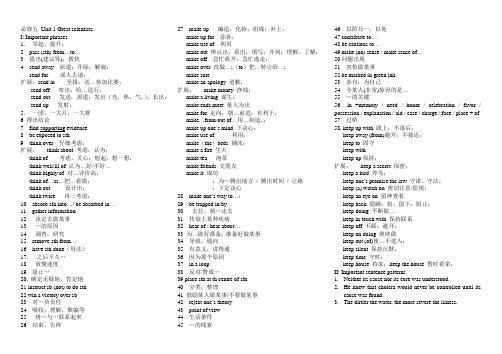
必修五Unit 1 Great scientistsI: Important phrases1.举起,提升;2 pass (sth) from…to…3 提出(建议等),拨快4 send away 派遣;开除;解雇;send for 派人去请;扩展:send in 呈报;送…参加比赛;send off 寄出;给…送行;send out 发送;派遣;发出(光,热,气,);长出;send up 发射;5.一团,一大片,一大群6 得出结论7 find supporting evidence8 be exposed to sth9 think over 仔细考虑;扩展:think about 考虑;认为;think of 考虑,关心;想起;想一想;think well/ill of 认为…好/不好…think highly of 对…评价高;think of…as…把…看做;think out 设计出;think twice 再三考虑;10 absorb sth into. ../ be absorbed in …11 gather information12 决定去做某事13 …的原因14 调查,研究15 remove sth from…16 have sth done(用法)17. 之后不久…18 放慢速度19 阻止…20. 确定无疑地,肯定地21 instruct sb (not) to do sth22 win a victory over sb23 对…负责任24 吸收;理解;欺骗等25 将…与…联系起来26 结束,告终27 make up 编造;化妆;组成;补上;make up for 弥补;make use of 利用make out 辨认出;看出;填写;开列;理解,了解;make off 急忙离开;急忙逃走;make over 改做…;(to)把…转让给…;make suremake an apology 道歉;扩展:make money 挣钱;make a living 谋生;make ends meet 量入为出make for 走向;朝…前进;有利于;make…from/out of…用…制造..;make up one’s mind 下决心;make use of 利用;make(the)beds 铺床;make a fire 生火make tea 泡茶make friends 交朋友make it 成功:为…腾出地方/ 腾出时间/ 让路:下定决心28 make one’s way to…:29 be trapped in/by…30 去往,朝…走去31 传染上某种疾病32 hear of / hear about…33 为…做好准备; 准备好做某事34 导致,通向35 有意义,讲得通36 因为那个原因37 in a loop38 反对/赞成…39 place sth at th centre of sth40 分类,整理41 鼓励某人做某事/不要做某事42 reject one’s theory43 point of view44 生活条件45 …的线索46 以防万一,以免47 contribute to…48 be cautious to…49 make (no) sense / make sense of…50问题出现51 害怕做某事52 be marked in green ink53 亲自;为自己54 令某人(非常)惊讶的是…55 …的关键56 in +memory / need / honor / celebration / favor /possession / explanation / aid / case / charge / face / place + of57 过桥58. keep up with 跟上;不落后;keep away (from)避开;不接近;keep to 固守keep withkeep up保持;扩展:keep a secret 保密;keep a bird 养鸟;keep one’s promise/the law 守诺、守法;keep (a) watch on 密切注意/监视;keep an eye on 留神查看keep back 隐瞒;扣,留下;阻止;keep doing 不断做…keep in touch with 保持联系keep off 不踩;避开;keep on doing 继续做keep out (of)使…不进入;keep silent 保持沉默;keep time 守时;keep house 持家;keep the house 暂时看家;II: Important sentence patterns1.Neither its cause nor its cure was understood.2.He knew that cholera would never be controlled until itscause was found.3.The dirtier the water, the more severe the illness.。
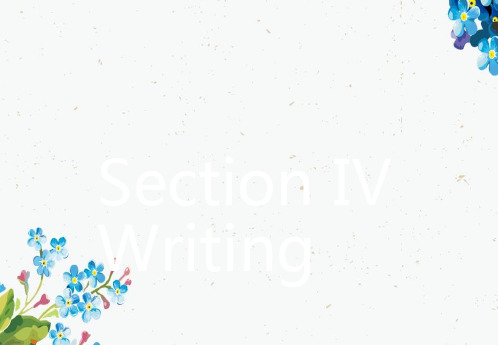

Unit 1 Great scientistPart 1 Teaching Design第一部分教学设计Period 1 A sample lesson plan for reading(JOHN SNOW DEFEATS “KING CHOLERA”) IntroductionIn this period, after the warming up, students will first be guided to share opinions on proving a new idea. Then they will be helped to read a narration about John Snow fighting cholera. They shall learn the text by reading and underlining, reading to finish the table, making a diagram of the text JOHN SNOW DEFEATS “KING CHOLERA” and retelling the text in their own words with the help of the diagram above.Objectives■To help students learn to describe people■To help students learn to read a narration about John Snow■To help students better understand “Great scientists”■To help students learn to use some important words and expressions■To help students identify examples of “The Past Participle (1) as the Predicative & attribute”in the textFocusAidsMultimedia facilities, tape-recorder, photos, diagramsProcedures1. Warming up⑴Warming up by definingGood morning, class. I am glad to see you on this special day, the day when you become a senior two student. I am happy to be your teacher of English.Today we are going to read about a certain scientist. But first let’s define the word “scientist”. What is a scientist?⑵Warming up by asking and answering questions about scienceTo begin with, work in groups of four and find out as many scientists as possible and their contributions. They can be both Chinese and foreign scientists, living or dead.⑶Warming up by talking about t op honor for two Chinese scientistsHello, everyone. Nice meeting you here. You are now a senior two student. Some of you will be a scientist in the future. But have you ever heard that Yuan Longping, director-general of the China National Hybrid Rice Research and Development Centre in central China's Hunan Province and Bai Chunli, vice-president of the Chinese Academy of Sciences in Beijing were formally introduced to the academy on April 28, 2007 at a global meeting of US academy members and foreign associates.●Yuan Longping, director-general of the China National Hybrid Rice Research and Development Centre in Central China's Hunan Province and Bai Chunli, vice-president of the Chinese Academy of Sciences in Beijing were formally introduced to the academy last Saturday at a global meeting of US academy members and foreign associates.Yuan, 77, dubbed the "father of hybrid rice" for his extraordinary contributions toward developing high-yield rice, is a household name in China.With more than half of China's paddy fields growing Yuan's rice, his scientific breakthrough has fed millions of people in the world's most populous country.His "super rice" has also been introduced to more than 20 other countries.●Bai, 52, is considered to be a leading expert in China's molecular nanostructure and nanotechnology studies."I think the fast development of Chinese science has drawn increased attention from the US academy," Bai said in an interview with China Daily last year shortly after he was elected.2. Pre-reading by sharing opinions on proving a new ideaAnybody might come out with a new idea. But how do we prove it in scientific research? How many stages are there in examining a new idea in scientific research? What are they?Now look at the blackboard to learn about the seven stages put in an order.Could you give an example to illustrate the seven stages?3. Reading⑴Listening and reading aloudTo know more about scientific research, turn to page 2 and read aloud the article. Try at the same time to locate the information to complete the form below.⑵Reading and underliningNow you are asked to go over the text the second time, looking for the expressions within the passage and underlining them at the same time. After class copy them into your Expression Notebook and write a short passage of your own making use of the expressions.⑶Reading to finish the table belowRead the text again to decide on the type of writing and summary of JOHN SNOW DEFEATS “KING CHOLERA”.⑷Making a diagram of the text JOHN SNOW DEFEATS “KING CHOLERA”⑸Retelling the text in your own words with the help of the diagram aboveRetelling can be useful, for it both strengthen ones’ learning of the vocabulary, the structure, and gives one a wonderful chance to practice speaking English.4. Closing down by taking a quizTo end this first period, we shall take a quiz.。
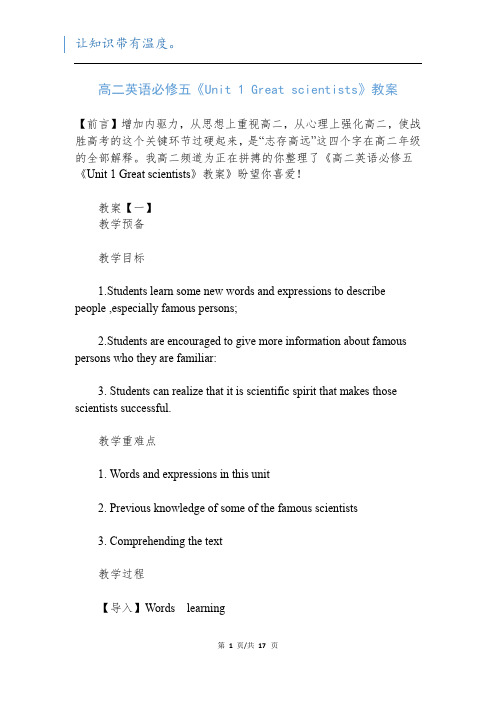
高二英语必修五《Unit 1 Great scientists》教案【前言】增加内驱力,从思想上重视高二,从心理上强化高二,使战胜高考的这个关键环节过硬起来,是“志存高远”这四个字在高二年级的全部解释。
我高二频道为正在拼搏的你整理了《高二英语必修五《Unit 1 Great scientists》教案》盼望你喜爱!教案【一】教学预备教学目标1.Students learn some new words and expressions to describe people ,especially famous persons;2.Students are encouraged to give more information about famous persons who they are familiar:3. Students can realize that it is scientific spirit that makes those scientists successful.教学重难点1. Words and expressions in this unit2. Previous knowledge of some of the famous scientists3. Comprehending the text教学过程【导入】Words learning(Students are assigned to learn the new words of this unit and find out the English explainations of the new words )Definitions or explanationsA.examine 1.general principles of an art or scienceB.repeat 2.say or do againC.theory 3.at once; without delayD.immediate 4.look at...carefully in order to learn about or from...plete 5.of great value, worth or useF.valuable 6.having all its parts; whole; finishedG.announce 7.make knownH.control e or bring to an endI.positive 9.power to order or directJ.conclude 10.quite certain or sure【讲授】useful sentences learning(The sentences are picked from the text.)1.“All roads lead to Rome, ”he encouraged me after I failed the entrance examination.2.This sentence doesn’t make any sense.3.Our English teacher is not only strict with us but also friendly to us.4.He is good-looking, apart from his nose.5.It is announced that the spacecraft, Shenzhou Ⅵ, landed on the earth successfully.6.It is not Tom but you who are to blame.7.In 1995, the Chinese government put forward a planfor“rejuvenating the nation by relying on science and education”.And it has helped Chinese scientists make many breakthroughs.8.Have you drawn any conclusion after you read this passage?9.Well done.So much for the learning of the new words and expressions.【讲授】Introduction of a classic articleTeacher introduce a famous person --Qian Xuesen and students learn to write an article about the famous scientis using the words and expressions they just learn in class.【活动】Share the outcomeStudents share their article orally and discuss whether they have used some good and advanced expressions.【练习】Consolidation完成句子(1)爱因斯坦被认为是二十世纪最宏大的科学家之一。

unit1 great scientist约翰.斯诺击败“霍乱王”约翰.斯诺曾经是伦敦一名著名的医生——他的确医术精湛,以至于维多利亚女王请他当私人医生。
但当他一想到要帮助得了霍乱的普通老百姓时,他就会感到振奋。
霍乱在当时是致命的疾病,人们既不知道它的病源,也不了解它的治疗方法。
因此每次爆发霍乱时候就有数千个惊恐的人死去。
约翰.斯诺想要面对挑战并解决这个问题。
他知道,再找到病源之前,霍乱是无法控制的。
霍乱之所以能致人死亡,当时有两种看法,斯诺对这两种推测都很感兴趣。
第一种看法是霍乱病毒在空气中繁殖着,它像一股危险的气体到处漂浮,直到找到病毒的受害者为止。
第二种看法是人们在吃饭的时候把这种病毒引入体内。
病毒从胃里发作而迅速殃及全身,患者就会很快死去。
约翰.斯诺推测第二种说法是正确的,但他需要证据。
因此,在1854年伦敦再次爆发霍乱的时候,他就着手准备他的调查。
当霍乱在贫民区迅速蔓延的时候,他就开始收集资料。
在两条特定的街道上。
霍乱流行的很严重,以致在10天之内就死去了500多人。
他决心要查明其原因。
首先他在一张地图上标明了所有死者居住的确切地方。
这给他提供了一条说明霍乱起因的很有价值的线索。
许多死者是在宽街的水泵附近(特别是这条街上的16、37、38和40号)。
约翰.斯诺还注意到有些住户(如宽街上的20号和21号以及剑桥街上的8号和9号)却无人死亡。
他没有预料到这一点,余生他做了进一步调查。
他发现,这些人都在剑桥街7号的酒馆里打工,而酒馆为他们提供免费啤酒喝,因此他们没有喝水泵抽上来的水。
看来霍乱的流行要归罪于饮用水了。
其次,约翰.斯诺调查了这两条街的水源情况。
他发现,水是从河里打来的,而河水被伦敦排出的脏水污染了。
约翰.斯诺马上叫宽街上惊慌失措的老百姓拆掉水泵的把手。
这样,水泵就用不成了。
不久,疫情就得到了缓解。
约翰.斯诺在此之前就曾经表明,霍乱是由病菌而不是由气团传播的。
在伦敦是另一个地方,他从两个与宽街爆发的霍乱有关联的死亡病例中找到了证据。
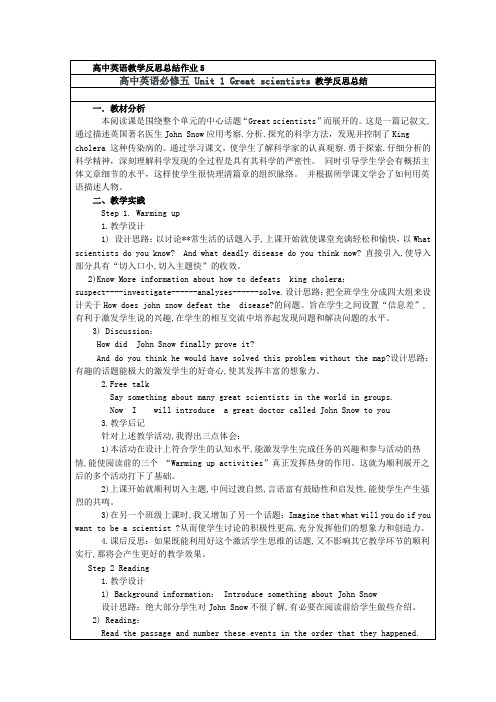
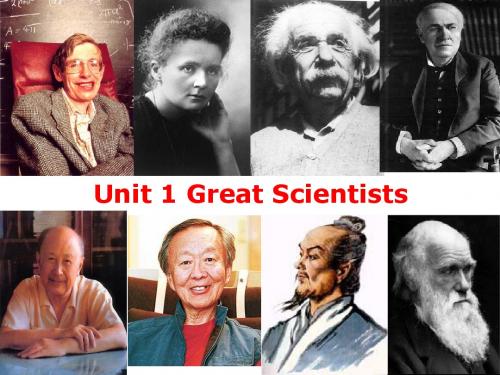
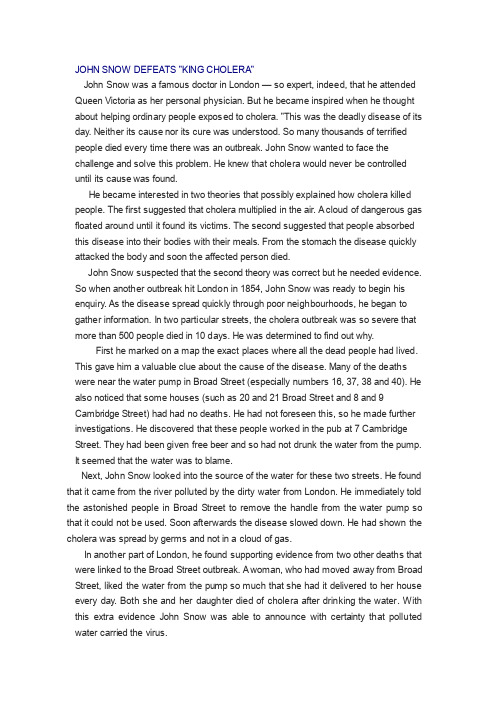
JOHN SNOW DEFEAT S "KING CHOLER A"John Snow was a famous doctor in London— so expert, indeed, that he attend ed QueenVictor ia as her person al physic ian. But he became inspir ed when he though t abouthelpin g ordina ry people expose d to choler a. "This was the deadly diseas e of its day. Neithe r its causenor its cure was unders tood. So many thousa nds of terrif ied people died everytime therewas an outbre ak. John Snow wanted to face thechalle nge and solvethis proble m. He knew that choler a wouldneverbe contro lleduntilits causewas found.He became intere stedin two theori es that possib ly explai ned how choler a killed people. The firstsugges ted that choler a multip liedin the air. A cloudof danger ous gas floate d around untilit foundits victim s. The second sugges ted that people absorb ed this diseas e into theirbodies with theirmeals. From the stomac h the diseas e quickl y attack ed the body and soon the affect ed person died.John Snow suspec ted that the second theory was correc t but he needed eviden ce. So when anothe r outbre ak hit London in 1854, John Snow was readyto beginhis enquir y. As the diseas e spread quickl y throug h poor neighb ourho ods, he beganto gather inform ation. In two partic ularstreet s, the choler a outbre ak was so severe that more than 500 people died in 10 days. He was determ inedto find out why.Firsthe marked on a map the exactplaces whereall the dead people had lived. This gave him a valuab le clue aboutthe causeof the diseas e. Many of the deaths were near the waterpump in BroadStreet (especi allynumber s 16, 37, 38 and 40). He also notice d that some houses (such as 20 and 21 BroadStreet and 8 and 9Cambri dge Street) had had no deaths. He had not forese en this, so he made furthe r invest igati ons. He discov eredthat thesepeople worked in the pub at 7 Cambri dge Street. They had been givenfree beer and so had not drunkthe waterfrom the pump. It seemed that the waterwas to blame.Next, John Snow looked into the source of the waterfor thesetwo street s. He foundthat it came from the riverpollut ed by the dirtywaterfrom London. He immedi ately told the astoni shedpeople in BroadStreet to remove the handle from the waterpump so that it couldnot be used. Soon afterw ardsthe diseas e slowed down. He had shownthe choler a was spread by germsand not in a cloudof gas.In anothe r part of London, he foundsuppor tingeviden ce from two otherdeaths that were linked to the BroadStreet outbre ak. A woman, who had movedaway from BroadStreet, likedthe waterfrom the pump so much that she had it delive red to her houseeveryday. Both she and her daught er died of choler a afterdrinki ng the water. With this extraeviden ce John Snow was able to announ ce with certai nty that pollut ed watercarrie d the virus.T o preven t this from happen ing again, John Snow sugges ted that the source of all the watersuppli es be examin ed. The watercompan ies were instru ctednot to expose people to pollut ed waterany more. Finall y "King Choler a" was defeat ed.unit 1约翰·斯洛击败“霍乱王”约翰·斯洛是伦敦一位著名的医生——他的确医术精湛,因而成为照料维多利亚女王的私人医生。

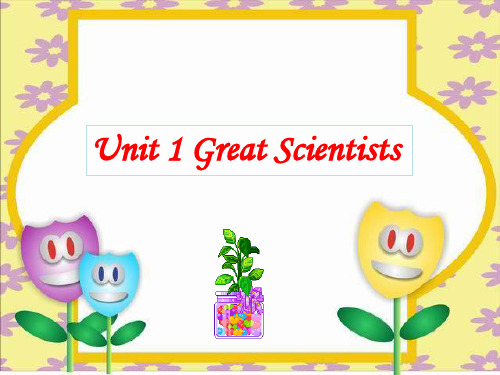
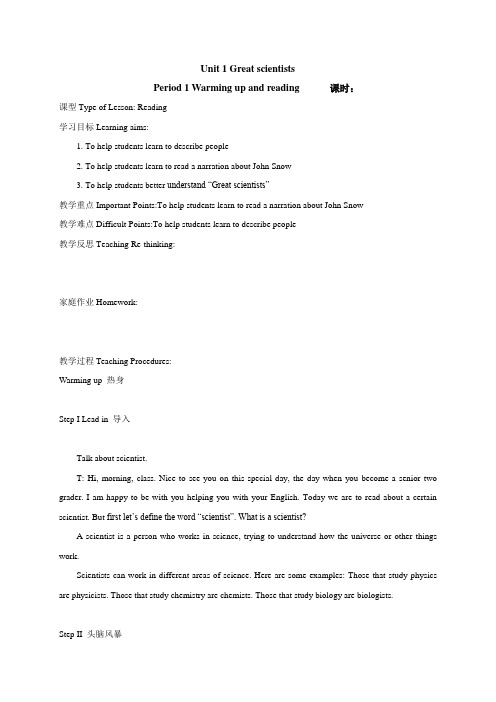
Unit 1 Great scientistsPeriod 1 Warming up and reading 课时:课型Type of Lesson: Reading学习目标Learning aims:1. To help students learn to describe people2. To help students learn to read a narration about John Snow3. To help students better understand “Great scientists”教学重点Important Points:To help students learn to read a narration about John Snow教学难点Difficult Points:To help students learn to describe people教学反思Teaching Re-thinking:家庭作业Homework:教学过程Teaching Procedures:Warming up 热身Step I Lead in 导入Talk about scientist.T: Hi, morning, class. Nice to see you on this special day, the day when you become a senior two grader. I am happy to be with you helping you with your English. Today we are to read about a certain scientist. But first let’s define the word “scientist”. What is a scientist?A scientist is a person who works in science, trying to understand how the universe or other things work.Scientists can work in different areas of science. Here are some examples: Those that study physics are physicists. Those that study chemistry are chemists. Those that study biology are biologists.Step II 头脑风暴Ask the students to try the quiz and find out who knows the most.T: There are some great scientific achievements that have changed the world. Can you name some of them? What kind of role do they play in the field of science? Do these achievements have anything in common? Match the inventions with their inventors below before you answer all these questions.1.Archimedes, Ancient Greek (287-212 BC), a mathematician.2. Charles Darwin, Britain (1808-1882). The name of the book is Origin of Species.3. Thomas Newcomen, British (1663-1729), an inventor of steam engine.4. Gregor Mendel, Czech, a botanist and geneticist.5. Marie Curie, Polish and French, a chemist and physicist.6. Thomas Edison, American, an inventor.7. Leonardo da Vinci, Italian, an artist.8. Sir Humphry Davy, British, an inventor and chemist.9. Zhang Heng, ancient China, an inventor.10. Stepper Hawking, British, a physicist.II. Pre-reading 预读Step IGet the students to discuss the questions on page 1 with their partners. Then ask the students to report their work. Encourage the students to express their different opinions.1.What do you know about infectious diseases?Infectious diseases can be spread to other people. They have an unknown cause and need public health care to solve them. People may be exposed to infectious disease, so may animals, such as bird flu,AIDS, SARS are infectious diseases. Infectious diseases are difficult to cure.2.What do you know about cholera?Cholera is the illness caused by a bacterium called Vibrio cholerae. It infects people’s intestines(肠), causing diarrhea and leg cramps (抽筋).The most common cause of cholera is by someone eating food or drinking water that has been contaminated(污染) with the bacteria. Cholera can be mild(不严重的) or even without immediate symptoms(症状), but a severe case can lead to death without immediately treatment.3. Do you know how to prove a new idea in scientific research?Anybody might come out with a new idea. But how do we prove it in scientific research? There are seven stages in examining a new idea in scientific research. And they can be put in the following order. What order would you put the seven in? Just guess.Find a problem→ Make up a question→ Think of a method→ Collect results→Analyse the results→ Draw a conclusion→ Repeat if necessaryUnit 1 Great scientistsPeriod 1 Warming up and reading 课时:课型Type of Lesson: Reading学习目标Learning aims:1. To help students learn to describe people2. To help students learn to read a narration about John Snow3. To help students better understand “Great scientists”教学重点Important Points:To help students learn to read a narration about John Snow教学难点Difficult Points:To help students learn to describe people教学反思Teaching Re-thinking:家庭作业Homework:教学过程Teaching Procedures:III. Reading 阅读Step I Pre-reading 预读1.Do you know John Snow?John Snow is a well-known doctor in the 19th centur y in London and he defeated “King Cholera”.2.Do you know what kind of disease is cholera?It is a kind of terrible disease caused by drinking dirty water and it caused a lot of deaths in the old times and it was very difficult to defeat.Let’s get to know how Dr. John Snow defeated “King Cholera” in 1854 in London in this reading passage:Step II Skimming 扫读Read the passage and answer the questions.1.Who defeats “King Cholera“? (John Snow)2.What happened in 1854? (Cholera outbreak hit London.)3.How many people died in 10 days? (500)4.Why is there no death at No. 20 and 21 Broad Street as well as at No. 8 and 9 Cambridge Street?(These families had not drunk the water from the Broad Street pump.)(Optional)Skim the passage and find the information to complete the form below.Who When What How ResultJohn Snow 1854 helpingordinarypeopleexposed tocholeraExamining the source ofall water supplies andfinding new methods ofdealing with pollutedwaster“King Cholera”defeatedStep III Scanning 找读Read the passage and number these events in the order that they happened.2 John Snow began to test two theories.1 An outbreak of cholera hit London in 1854.4 John Snow marked the deaths on a map.7 He announced that the water carried the disease.3 John Snow investigated two streets where the outbreak was very severe.8 King Cholera was defeated.5 He found that most of the deaths were near a water pump.6 He had the handle removed from the water pump.Step IV Main idea and correct stage 精读Read the passage and put the correct stages into the reading about research into a disease.John Snow Defeats “King Cholera”Paragraph Stages General ideas 1Find a problem:What cause the cholera?The causes of cholera2Make up a question:Which is right?The correct or possible theory3Think of a method:Test two theory Collect data on where people were ill and died and where they got their water4Collect results:Mark the death Plot information on a map to find out where people died or did not die5Analyze the results:Find the resource of the water Look into the water to see if that is the cause of the illness6 Find supporting evidence Find other evidences to confirm his conclusion7Draw a conclusion The polluted dirty source of drinking water wasto blame for the cause of the London choleraStep V Group discussion 分组讨论Answer the questions (Finish exercise 2 on Page 3)1. John Snow believed Idea 2 was right. How did he finally prove it?(John Snow finally proved his idea because he found an outbreak that was clearly related to cholera, collected information and was able to tie cases outside the area to the polluted water.)2. Do you think John Snow would have solved this problem without the map?(No. The map helped John Snow organize his ideas. He was able to identify those households that had had many deaths and check their water-drinking habits. He identified those houses that had had no deaths and surveyed their drinking habits. The evidence clearly pointed to the polluted water being the cause.)3. Cholera is a 19th century disease. What disease do you think is similar to cholera today?(Two diseases, which are similar today, are SARS and AIDS because they are both serious, have an unknown cause and need public health care to solve them.)Step VI 概括总结Using the stages for scientific research and write a summary.Unit 1 Great scientistsPeriod 2&3 Language focus 课时:课型Type of Lesson: Words & Expressions学习目标Learning aims: To help students learn to use some important words and expressions教学重点Important Points: To help students learn to remember some important words and expressions教学难点Difficult Points: To help students learn to use some important words and expressions教学反思Teaching Re-thinking:家庭作业Homework:教学过程Teaching Procedures:Step I Warming up 热身1.characteristic①n. a quality or feature of sth. or someone that is typical of them and easy to recongnize.特征;特性What characteristics distinguish the Americans from the Canadians.② a. very t ypical of a particular thing or of someone’s characer 典型性的,Such bluntness is characteristic of him.Windy days are characteristic of March.[辨析]characteristic与charactercharacteristic是可数名词,意为“与众不同的特征“character表示(个人、集体、民族特有的)“性格、品质”,还意为“人物;文字”What you know about him isn’t his real character.2. put forward: to state an idea or opinion, or to suggest a plan or person, for other people toconsider提出He put forward a new theory.The foreigners have put forward a proposal for a joint venture.An interesting suggestion for measuring the atmosphere around Mars has been put forward.☆ put on穿上;戴上;增加put out熄灭(灯);扑灭(火) put up with…忍受put down写下来;放下;put off 耽误; 延期put up建立; 建造,put up举起,搭建,粘贴3. analyze: to examine or think about something carefully in order to understand it vt.分析结果、检讨、细察A computer analyses the photographs sent by the satellite.The earthquake expert tried to analyze the cause of the earthquake occurred on May 12,2008.Let’s analyze the problem and see what went wrong.He analyzed the food and found that it contained poison.We must try to analyze the causes of the strike.☆ analysis n.分析,解析,分解4. conclude: decide that sth. is true after considering al the information you have 得出结论;推论出to end sth. such as a meeting or speech by doing or saying one final thing vt. & vi结束,终止;We concluded the meeting at 8 o’clock with a prayer.From his appearance we may safely conclude that he is a heavy smoker.What do you conclude from these facts?We conclude to go out / that we would go out.conclusion n.结论arrive at a conclusion; come to a conclusion; draw a conclusion; reach a conclusionWhat conclusion did you come to / reach / draw / arrive at?From these facts we can draw some conclusions about how the pyramids were built.Step 2 Reading1. defeat① vt. to win a victory over someone in a war, competition, game etc.打败,战胜,使受挫I’ve tried to solve the problem, but it defeats me!Our team defeated theirs in the game.② n.失败,输failure to win or succeedThis means admitting defeat.They have got six victories and two defeats.[辨析]win, beat与defeat①win “赢得”赛事、战事、某物;后接人时,意为“争取赢得…的好感或支持;说服”②beat “战胜”“击败”比赛中的对手,可与defeat互换We beat / defeated their team by 10 scores.They won the battle but lost many men.The local ball team won the state championship by beating / defeating all the other teams.I can easily beat /defeat him at golf.He is training hard to win the race and realize his dream of becoming a champion at the 2008 Olympic Games.2. expert①n. someone who has a special skill or special knowledge of a subject专家,能手an expert in psychology an agricultural expert② a. having special skill or special knowledge of a subject熟练的,有专门技术的an expert rider an expert job需专门知识的工作He is expert in / at cooking.3. attend vt. &vi 参加,注意,照料① be present at参加attend a ceremony / lecture / a movie / school / class / a meetingI shall be attending the meeting.Please let me know if you are unable to attend the conference.② attend to (on): to look after, care for, serve伺候, 照顾,看护The queen had a good doctor attending on her.Dr Smith attended her in hospital. 治疗Are you being attended to?接待Mother had to attend to her sick son.③ attend to处理,注意倾听attend to the matterA nurse attends to his needs.Can you attend to the matter immediately?I may be late – I have got one or two things to attend to.Excuse me, but I have an urgent matter to attend to.[辨析]attend, join, join in与take part in①attend指参加会议、上课、上学、听报告等②join 指加入某组织、团体,成为其中一员③join in指加入某种活动;表示与某人一起做某事join sb. in sth.④take part in指参加正式的、有组织的活动,切在活动中起积极作用Only 2 people attended the meeting.He joined the Communist Youth League in 2007.Will you join us in the game?We often tale part in the after-class activities.Unit 1 Great scientistsPeriod 2&3 Language focus 课时:课型Type of Lesson: Words & Expressions学习目标Learning aims: To help students learn to use some important words and expressions教学重点Important Points:To help students learn to remember some important words and expressions 教学难点Difficult Points:To help students learn to use some important words and expressions教学反思Teaching Re-thinking:家庭作业Homework:教学过程Teaching Procedures:4. expose : to show sth. that is usually covered暴露expose sth. to the light of day 把某事暴露于光天化日之下I threatened to expose him ( to the police). 我威胁要(向警察)揭发他.He exposed his skin to the sun.他把皮肤暴露在阳光下.The old man was left exposed to wind and rain.When he smiled he exposed a set of perfect white teeth.5. cure vt. & n. to make someone who is ill well agian治疗,痊愈When I left the hospital I was completely cured.①cure sb of a diseaseWhen you have a pain in your shoulders, you will go to see a doctor. The doctor will cure you.The only way to cure backache is to rest.He will cure the pain in your shouldersWhen I left the hospital I was completely cured.The illness cannot be cured easily.Although the boy was beyond cure, his parents tried to cure him of bad habits.②a cure for a diseaseAspirin is said to be a wonderful cure for the pain.There is still no cure for the common cold.Is there a certain cure for cancer yet?③a cure for sth.: to remove a problem, or improve a bad situation解决问题,改善困境The prices are going up every day, but there is no cure for rising prices.[辨析]cure与treat①cure主要指痊愈,强调的是结果②treat强调治疗过程,指通过药物、特别的食品或运动治疗病人或疾病,不强调结果。
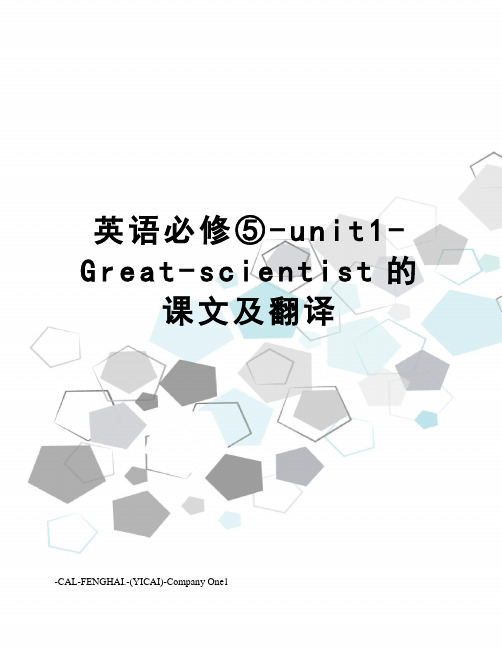
英语必修⑤-u n i t1-G r e a t-s c i e n t i s t的课文及翻译-CAL-FENGHAI.-(YICAI)-Company One1JOHN SNOW DEFEATS "KING CHOLERA"John Snow was a famous doctor in London — so expert, indeed, that he attended Queen Victoria as her personal physician. But he became inspired when he thought about helping ordinary people exposed to cholera. "This was the deadly disease of its day. Neither its cause nor its cure was understood. So many thousands of terrified people died every time there was an outbreak. John Snow wanted to face the challenge and solve this problem. He knew that cholera would never be controlled until its cause was found.He became interested in two theories that possibly explained how cholera killed people. The first suggested that cholera multiplied in the air. A cloud of dangerous gas floated around until it found its victims. The second suggested that people absorbed this disease into their bodies with their meals. From the stomach the disease quickly attacked the body and soon the affected person died.John Snow suspected that the second theory was correct but he needed evidence. So when another outbreak hit London in 1854, John Snow was ready to begin his enquiry. As the disease spread quickly through poor neighbourhoods, he began to gather information. In two particular streets, the cholera outbreak was so severe that more than 500 people died in 10 days. He was determined to find out why.First he marked on a map the exact places where all the dead people had lived. This gave him a valuable clue about the cause of the disease. Many of the deaths were near the water pump in Broad Street (especially numbers 16, 37, 38 and 40). He also noticed that some houses (such as 20 and 21 Broad Street and 8 and 9 Cambridge Street) had had no deaths. He had not foreseen this, so he made further investigations. He discovered that these people worked in the pub at 7 Cambridge Street. They had been given free beer and so had not drunk the water from the pump. It seemed that the water was to blame.Next, John Snow looked into the source of the water for these two streets. He found that it came from the river polluted by the dirty water from London. He immediately told the astonished people in Broad Street to remove the handle from the water pump so that it could not be used. Soon afterwards the disease slowed down. He had shown the cholera was spread by germs and not in a cloud of gas.In another part of London, he found supporting evidence from two other deaths that were linked to the Broad Street outbreak. A woman, who had moved away from Broad Street, liked the water from the pump so much that she had it delivered to her house every day. Both she and her daughter died of cholera after drinking the water. With this extra evidence John Snow was able to announce with certainty that polluted water carried the virus.To prevent this from happening again, John Snow suggested that the source of all the water supplies be examined. The water companies were instructed not to expose people to polluted water any more. Finally "King Cholera" was defeated.unit 1约翰·斯洛击败“霍乱王”约翰·斯洛是伦敦一位著名的医生——他的确医术精湛,因而成为照料维多利亚女王的私人医生。
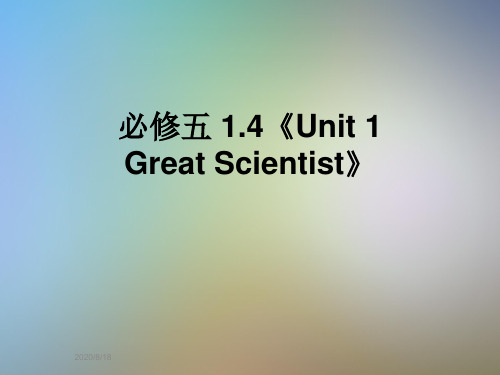
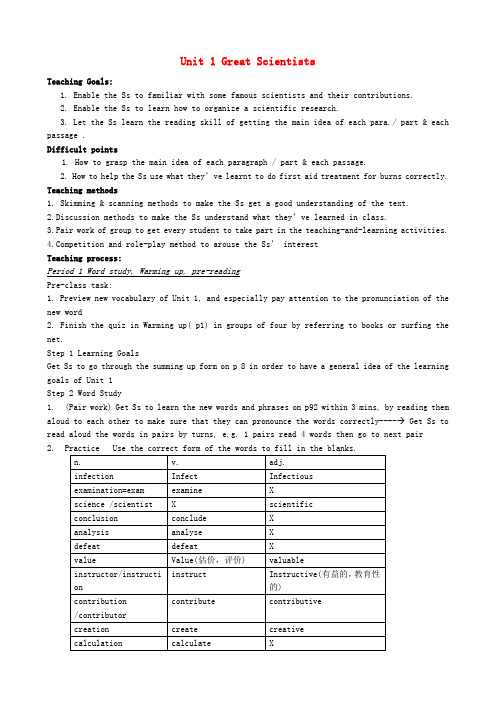
Unit 1 Great ScientistsTeaching Goals:1. Enable the Ss to familiar with some famous scientists and their contributions.2. Enable the Ss to learn how to organize a scientific research.3. Let the Ss learn the reading skill of getting the main idea of each para./ part & each passage .Difficult points1. How to grasp the main idea of each paragraph / part & each passage.2. How to help the Ss use what they’ve learnt to do first aid treatment for burns correctly. Teaching methods1. Skimming & scanning methods to make the Ss get a good understanding of the text.2.Discussion methods to make the Ss understand what they’ve learned in class.3.Pair work of group to get every student to take part in the teaching-and-learning activities.petition and role-play method to arouse the Ss’ interestTeaching process:Period 1 Word study, Warming up, pre-readingPre-class task:1. Preview new vocabulary of Unit 1, and especially pay attention to the pronunciation of the new word2. Finish the quiz in Warming up( p1) in groups of four by referring to books or surfing the net.Step 1 Learning GoalsGet Ss to go through the summing up form on p 8 in order to have a general idea of the learning goals of Unit 1Step 2 Word Study1. (Pair work) Get Ss to learn the new words and phrases on p92 within 3 mins, by reading them aloud to each other to make sure that they can pronounce the words correctly---- Get Ss to read aloud the words in pairs by turns, e.g. 1 pairs read 4 words then go to next pair2. Practice Use the correct form of the words to fill in the blanks.Step 3. Warming up (Group competition and introduce the great scientists)1.Check the answers to the quiz to find out which group know the most .2.Introduce the great scientists.1) Archimedes (287—212 BC) Ancient Greek. He was a mathematician. He found that if you put an object into water the water pushes the object up. It rises and partly floats.“Give me a place to stand on, and I can move the earth.” ----Archimedes2) Charlie Darwin(1808-1882) British naturalist. The Origin of Species was published in 1859. It explained how plants and animals had changed over time to fit in with a changing environment. His book showed that people had developed from apes.3) Gregor Mendel(1822—1884) Czech. The father of genetic. He grew pea plants and developed ideas on heredity (遗传) and inherited characteristics. Between 1856—1863 he grew 28,000 pea plants. He examined seven kinds of seed and plant characteristics and developed some laws of inheritance.4) Marie Curie ( Polish ) (1867-1934) was born in Poland, moved to Paris and studied chemistry and physics there. She married Pierre Curie and together they studied radioactive materials and discovered radium. In 1911 she received the Nobel Prize in Chemistry. Her death in 1934 was almost certainly due to radiation in her work.5) Thomas Edison(1847----1931) He was already an inventor of other electrical devices (phonograph, electric light bulb) when in 1882 he designed a system for providing New York with electricity from a central power station. This was a tremendous achievement, which had previously been thought impossible.6) Leonardo da Vinci (Italian) (1452-1519)He was a famous Italian artist whose skill for showing human skin tones made his paintings seem to come alive. He used to study dead people in order to make his paintings as accurate as possible. Some of his famous paintings include “The Adoration of the Magi” and the “The Last Supper”. Later in his life he lived in France where he designed a submarine (潜水艇) and a flying machine.7) British. He did research into different gases and discovered the medical value of nitrous oxide (laughing gas) as an anaesthetic.(麻醉药) In 1815 he developed a safety lamp for miners.8) Zhang Heng ,Chinese( 78-----139) He invented the first seismograph to indicate in the direction of an earthquake. It was in the shape of a cylinder with eight dragonheads round the top, each with a ball in its mouth. Around the bottom were eight frogs directly under a dragon’s head. When an earthquake occurred, a ball fell out of the dragon’s mouth, making a noise.9) Stephen Hawking,British(1942--- ) He has worked in astronomy and studied black holes in space. He has shown that black holes do not only absorb everything around them but, from time to time, throw out matter as well. This may mark the beginning of new galaxies. This is an advance on the old theory which said that black holes “eat” everything they come across.Step 4 Pre-reading1. (Pair work) What five most important qualities do you think a scientist should have? Give reasons.clever/talented strict patient creative determined/strong-willed positive honest energetic intelligent/hard-working ambitious careful co-operative confident brave2. (Group work) Ex2, p1Do you know how to prove a new idea in scientific research? Discuss in groups the stages in examining a new scientific idea. What order would you put them in?8)Draw a conclusion 3)Think of a method 4)Collect results 5)Make up a question 1)Find a problem 5)Analyse the results 6)find supporting evidence 7)Repeat if necessary Step 5. SummarySeeing much, suffering much, and studying much are three pillars (支柱,要素) of learning. learning without thought is a labour lost; thought without learning is perilous(危险的)3. To know the disease is half the cure. 找出病根等于医治了一半。

高二英语必修五课件:《Unit 1 Great scientists》学习不光要有不怕困难,永不言败的精神,还有有勤奋的努力,下面本文库为您推荐高二英语必修五课件:《Unit 1 Great scientists》。
教案【一】教学准备教学目标1.Students learn some new words and expressions to describe people ,especially famous persons;2.Students are encouraged to give more information about famous persons who they are familiar:3. Students can realize that it is scientific spirit that makes those scientists successful.教学重难点1. Words and expressions in this unit2. Previous knowledge of some of the famous scientists3. Comprehending the text教学过程【导入】Words learning(Students are assigned to learn the new words of this unit and find out the English explainations of the new words )Definitions or explanationsA.examine 1.general principles of an art or scienceB.repeat 2.say or do againC.theory 3.at once; without delayD.immediate 4.look at...carefully in order to learn about or from...plete 5.of great value, worth or useF.valuable 6.having all its parts; whole; finishedG.announce 7.make knownH.control e or bring to an endI.positive 9.power to order or directJ.conclude 10.quite certain or sure【讲授】useful sentences learning(The sentences are picked from the text.)1."All roads lead to Rome,"he encouraged me after I failed the entrance examination.2.This sentence doesn’t make any sense.3.Our English teacher is not only strict with us but also friendly to us.4.He is good-looking, apart from his nose.5.It is announced that the spacecraft,Shenzhou Ⅵ, landed on the earth successfully.6.It is not Tom but you who are to blame.7.In 1995,the Chinese government put forward a plan for"rejuvenating the nation by relying on science and education".And it has helped Chinese scientists make many breakthroughs.8.Have you drawn any conclusion after you read this passage9.Well done.So much for the learning of the new words and expressions.【讲授】Introduction of a classic articleTeacher introduce a famous person --Qian Xuesen and students learn to write an article about the famous scientis using the words and expressions they just learn in class.【活动】Share the outcomeStudents share their article orally and discuss whether they have used some good and advanced expressions.【练习】Consolidation完成句子(1)爱因斯坦被认为是二十世纪最伟大的科学家之一。